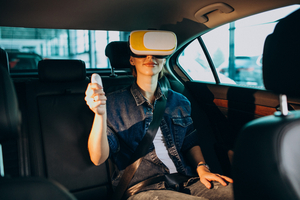The automotive industry has long been at the forefront of technological advancements, and Virtual Reality (VR) is now playing a significant role in shaping its future. From initial concept design to final product testing, VR is transforming the way vehicles are conceived, developed, and brought to market. By offering immersive simulations, VR allows automotive manufacturers to explore design options, test safety features, and streamline the production process—all before a physical prototype is built.
At the center of this revolution are cutting-edge VR development company that are creating innovative tools for the automotive industry. These companies are developing VR solutions that enhance the precision, speed, and cost-effectiveness of vehicle design and testing. In this article, we’ll explore how VR is making waves in the automotive sector and the critical role of these development companies in revolutionizing the process.
Custom VR Development Companies: Redefining Vehicle Design
-
Accelerating Design Iterations
Custom VR development companies provide automotive designers with immersive environments to visualize and refine their concepts in real time. Designers can walk around virtual vehicles, tweak design details, and evaluate different configurations without waiting for physical prototypes. This reduces time-to-market while maintaining design quality.
-
Collaborative Virtual Workspaces
These companies also create virtual collaboration platforms where design teams, engineers, and stakeholders can gather in a shared VR environment to discuss and refine vehicle designs. This eliminates geographical barriers, allowing global teams to work together seamlessly, improving communication and decision-making in real time.
Innovative VR Development Companies: Enhancing Vehicle Testing and Safety
-
Virtual Crash Testing
Innovative VR development companies are revolutionizing how automotive companies conduct crash tests. Instead of relying solely on physical prototypes, manufacturers can use virtual simulations to test various crash scenarios and analyze the structural integrity of vehicles. This allows for faster, more cost-efficient testing, while still ensuring that safety standards are met.
-
Simulating Real-World Driving Conditions
With the help of innovative VR development companies, automakers can now simulate a wide range of real-world driving conditions in virtual environments. These simulations allow engineers to test how vehicles perform in extreme weather, rough terrains, or heavy traffic, helping to fine-tune driving dynamics and safety features before road tests begin.
Advanced VR Development Companies: Streamlining the Production Process
-
Virtual Assembly Line Optimization
Advanced VR development companies are also helping automotive manufacturers optimize their production lines. By simulating assembly processes in virtual environments, companies can identify bottlenecks, improve efficiency, and troubleshoot potential issues before they occur in the real world. This saves time and reduces production costs.
-
Training Workers with VR
In addition to improving the design and testing phases, VR is being used to train assembly line workers in virtual environments. This allows new employees to practice assembling vehicles without risking damage to actual parts, enhancing both worker proficiency and safety in the process.
Conclusion
Virtual reality is rapidly transforming the automotive industry, and the role of cutting-edge VR development companies is pivotal in this change. From speeding up the design process to enhancing vehicle testing and optimizing production, these companies are driving innovation in how vehicles are built and tested. As VR technology continues to evolve, we can expect even greater efficiencies and advancements in the automotive sector, helping manufacturers bring safer, more reliable vehicles to market faster than ever before.
